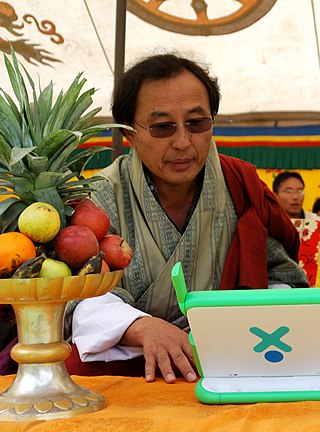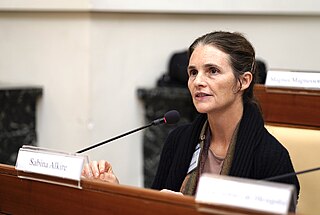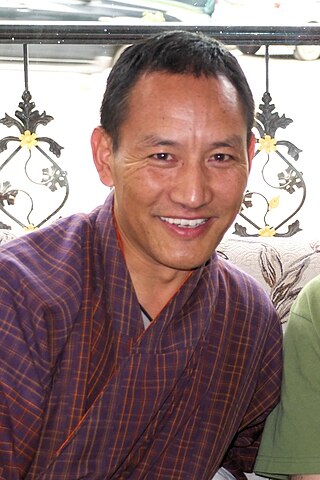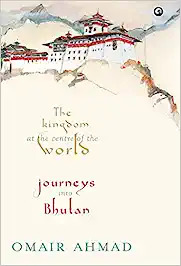Related Research Articles

The economy of Bhutan is based on agriculture and forestry, which provide the main livelihood for more than 60% of the population. Agriculture consists largely of subsistence farming and animal husbandry. Rugged mountains dominate the terrain and make the building of roads and other infrastructure difficult. Bhutan is among the richest by gross domestic product (nominal) per capita in South Asia, at $3,491 as of 2022, but it still places 153rd, and among the poorest in the world. The total gross domestic product is only $2,653 million, and 178th according to IMF.
Quality of life (QOL) is defined by the World Health Organization as "an individual's perception of their position in life in the context of the culture and value systems in which they live and in relation to their goals, expectations, standards and concerns".

Jigme Singye Wangchuck is a member of the House of Wangchuck who was the king of Bhutan from 1972 until his abdication in 2006. During his reign, he advocated the use of a Gross National Happiness index to measure the well-being of citizens rather than Gross domestic product.

Jigme Dorji Wangchuck was the 3rd Druk Gyalpo of Bhutan.

Gross National Happiness, sometimes called Gross Domestic Happiness (GDH), is a philosophy that guides the government of Bhutan. It includes an index which is used to measure the collective happiness and well-being of a population. Gross National Happiness Index is instituted as the goal of the government of Bhutan in the Constitution of Bhutan, enacted on 18 July 2008.

LyonpoSangay Ngedup was Prime Minister of Bhutan from 1999 to 2000 and again from 2005 to 2006.

Dasho Kinley Dorji was Bhutan's first trained journalist who became founder, then managing director and editor in chief of Kuensel, Bhutan's national newspaper. In 2009 he became Secretary of the Ministry of Information and Communications, a position he held until 2016.
The Centre for Bhutan Studies and GNH Research is a research institute located in Thimphu, Bhutan, established in 1999 with the purpose of promoting research and scholarship in Bhutan.

The Legatum Prosperity Index is an annual ranking developed by the Legatum Institute, an independent educational charity founded and part-funded by the private investment firm Legatum. The ranking is based on a variety of factors including wealth, economic growth, education, health, personal well-being, and quality of life.
Human rights in Bhutan are those outlined in Article 7 of its Constitution. The Royal Government of Bhutan has affirmed its commitment to the "enjoyment of all human rights" as integral to the achievement of 'gross national happiness' (GNH); the unique principle which Bhutan strives for, as opposed to fiscally based measures such as GDP.
Although for many decades, it was customary to focus on GDP and other measures of national income, there has been growing interest in developing broad measures of economic well-being. National and international approaches include the Beyond GDP programme developed by the European Union, the Better Lives Compendium of Indicators developed by the OECD, as well as many alternative metrics of wellbeing or happiness. One of the earliest attempts to develop such an index at national level was Bhutan's Gross National Happiness Index and there are a now a number of similar projects ongoing around the world, including a project to develop for the UK an assessment of national well-being, commissioned by the Prime Minister David Cameron and led by the Office for National Statistics.

Sabina Alkire is an American academic and Anglican priest, who is the director of the Oxford Poverty and Human Development Initiative (OPHI), an economic research centre within the Oxford Department of International Development at the University of Oxford, England, which was established in 2007. She is a fellow of the Human Development and Capability Association. She has worked with organizations such as the Commission on the Measurement of Economic Performance and Social Progress, the United Nations Human Development Programme Human Development Report Office, the European Commission, and the UK's Department for International Development.

The World Happiness Report is a publication that contains articles and rankings of national happiness, based on respondent ratings of their own lives, which the report also correlates with various life factors. The report primarily uses data from the Gallup World Poll. As of March 2024, Finland has been ranked the happiest country in the world seven times in a row.

Lopen Karma Phuntsho is a former monk and Bhutanese scholar who specialises in Buddhism, Tibetan & Himalayan Studies and Bhutan, and has published a number of works including eight books, translations, book reviews and articles on Buddhism, Bhutan and Tibetan Studies. His The History of Bhutan has been called "the first book to offer a comprehensive history of Bhutan in English" and received Choice Outstanding Academic Title Award in 2015.
Med Jones is an American economist. He is the president of International Institute of Management, a U.S. based research organization. His work at the institute focuses on economic, investment, and business strategies.
Gross National Well-being (GNW), also known as Gross National Wellness, is a socioeconomic development and measurement framework. The GNW Index consists of seven dimensions: economic, environmental, physical, mental, work, social, and political. Most wellness areas include both subjective results and objective data.
The World Happiness Council is a think tank of politicians and researchers based in the United Arab Emirates, intended to promote happiness and subjective well-being through the identification of public policy for policymakers worldwide and the standardization of happiness as a measure to guide governments.
Shingkhar Lam Kunzang Wangchuk was a Bhutanese politician, who served as a speaker of the Gyelyong Tshogdu. After his uncle went missing, he served two Druk Gyalpos (kings) of Bhutan. He created the insignia for the Royal Bhutan Army and rewrote the Druk Tsendhen.
LyonphoThakur Singh Powdyel is a Bhutanese politician and educator of Nepali descent. He served as Minister of Education from 2008 to 2013, overseeing the Green Schools program as a part of the implementation of Gross National Happiness in Bhutan. He is currently the president of Royal Thimphu College.

The Kingdom at the Centre of the World: Journeys into Bhutan is a non-fiction book by Omair Ahmad.
References
- 1 2 3 "Dasho Karma Ura". The Himalayan Initiatives. Retrieved 2021-03-22.
- ↑ "Interview of Dasho Karma Ura (President, Centre for Bhutan Studies)" . Retrieved 28 July 2021.
- ↑ "Karma Ura | RIGSS". rigss.bt. Retrieved 2021-03-22.
- ↑ Raj OK, Anand. "Think about death: Dasho Karma Ura reveals a nation's secret to happiness". Gulf News. Retrieved 16 July 2021.